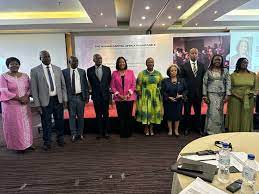APA-Abidjan (Côte d’Ivoire) The Ivorian Minister of National Education and Literacy, Professor Mariatou Kone, took part in an open round table in Addis Ababa on the theme “Linking the foundations of education to the future of the continent.”
Initiated by the Association for Development in Africa (ADEA), UNICEF, Human Capital Africa (HCA) and the Dangote Foundation, the event took place on Monday 12 February 2024 in the Ethiopian capital.
The round table was attended by Mrs. Sahle-Work Zewde, President of Ethiopia. It was an opportunity for Minister Mariatou Kone to present the steps taken by the Ivorian government to alleviate the learning crises that Côte d’Ivoire and many other countries have been experiencing for several years.
These measures include the organisation of the ‘Etats Generaux de l’Education Nationale et de l’Alphabétisation (National Education and Literacy Forumeducation , EGENA), which has helped to identify and address the problems facing the Ivorian system with transformative levers.
This participatory and inclusive process, which attracted the support of all the nation’s driving forces and all the parties involved, enabled the Ivorian government to initiate a number of reforms and to renew its commitment, both nationally and internationally, to a more efficient system.
Since then, Côte d’Ivoire has put in place several mechanisms to monitor and evaluate the implementation of the reforms identified.
These mainly concern the involvement of stakeholders and the improvement of early learning, which has been made a national priority.
This choice has been confirmed as part of the development of the Global Partnership Pact for Education, for which the funding mobilised should make it possible to support this priority.
It also involves the definition of a national programme to improve early learning (PNAPAS), which incorporates the various teaching approaches that have proved their worth (structured teaching and remedial teaching) and a roadmap for its deployment throughout the country.
The construction of a robust monitoring and evaluation system, involving the establishment of an institutional capacity for the evaluation of learning, with the creation of a programme monitoring and follow-up department comprising national managers and a capacity-building plan.
In her speech, Mariatou Kone highlighted the organisation of regular evaluations at national level and participation in several international evaluations, namely the ‘Programme d’Analyse des Systèmes Educatifs des Pays de l’Afrique Francophone’ (Programme to analyse education systems in French-speaking African countries, PASEC) and the Evaluation des ‘Competences Fondamentales en Lecture’ (Basic reading skills, EGRA).
She mentioned the inclusion of learning-related indicators in the Contracts of Objectives and Performance (COP) as tools for good management and improved governance of the national education system.
The minister also mentioned the setting up of an education laboratory (EdLab) to produce and use evidence-based data for effective decision-making, and the establishment of a knowledge and lessons learned management function within the Education Reform Support and Coordination Unit (CAC).
Professor Mariatou Kone also mentioned the systematisation of sector reviews, including the production of performance reports, which enable the achievement of objectives to be assessed.
She also highlighted the establishment of solid functional relations with the Local Group of Education Partners (GLPE) in order to encourage the co-construction of the system through innovative initiatives.
The main aims of this event are to draw up a roadmap for the ministerial coalition and to deliver a collective message to the Heads of State and Government of the African Union, so that they can take decisions and measures relating to the ecosystem of the education and training sector.
AP/fss/as/APA


